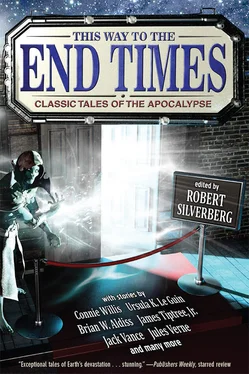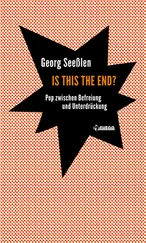Presently, however, we learned to contemplate the whole great saga of man as a completed work of art, and to admire it no less for its sudden and tragic end than for the promise in it which was not to be fulfilled. Grief was now transfigured wholly into ecstasy. Defeat, which had oppressed us with a sense of man’s impotence and littleness among the stars, brought us into a new sympathy and reverence for all those myriads of beings in the past out of whose obscure strivings we had been born. We saw the most brilliant of our own race and the lowliest of our prehuman forerunners as essentially spirits of equal excellence, though cast in diverse circumstances. When we looked round on the heavens, and at the violet splendor which was to destroy us, we were filled with awe and pity, awe for the inconceivable potentiality of this bright host, pity for its self-thwarting effort to fulfil itself as the universal spirit.
At this stage it seemed that there was nothing left for us to do but to crowd as much excellence as possible into our remaining life, and meet our end in the noblest manner. But now there came upon us once more the rare experience of racial mentality. For a whole Neptunian year every individual lived in an enraptured trance, in which, as the racial mind, he or she resolved many ancient mysteries and saluted many unexpected beauties. This ineffable experience, lived through under the shadow of death, was the flower of man’s whole being. But I can tell nothing of it, save that when it was over we possessed, even as individuals, a new peace, in which, strangely but harmoniously, were blended grief, exaltation, and god-like laughter.
In consequence of this racial experience we found ourselves faced with two tasks which had not before been contemplated. The one referred to the future, the other to the past.
In respect of the future, we are now setting about the forlorn task of disseminating among the stars the seeds of a new humanity. For this purpose we shall make use of the pressure of radiation from the sun, and chiefly the extravagantly potent radiation that will later be available. We are hoping to devise extremely minute electro-magnetic “wave-systems,” akin to normal protons and electrons, which will be individually capable of sailing forward upon the hurricane of solar radiation at a speed not wholly incomparable with the speed of light itself. This is a difficult task. But, further, these units must be so cunningly inter-related that, in favorable conditions, they may tend to combine to form spores of life, and to develop, not indeed into human beings, but into lowly organisms with a definite evolutionary bias toward the essentials of human nature. These objects we shall project from beyond our atmosphere in immense quantities at certain points of our planet’s orbit, so that solar radiation may carry them toward the most promising regions of the galaxy. The chance that any of them will survive to reach their destination is small, and still smaller the chance that any of them will find a suitable environment. But if any of this human seed should fall upon good ground, it will embark, we hope, upon a somewhat rapid biological evolution, and produce in due season whatever complex organic forms are possible in its environment. It will have a very real physiological bias toward the evolution of intelligence. Indeed it will have a much greater bias in that direction than occurred on the Earth in those sub-vital atomic groupings from which terrestrial life eventually sprang.
It is just conceivable, then, that by extremely good fortune man may still influence the future of this galaxy, not directly but through his creature. But in the vast music of existence the actual theme of mankind now ceases for ever. Finished, the long reiterations of man’s history; defeated, the whole proud enterprise of his maturity. The stored experience of many mankinds must sink into oblivion, and today’s wisdom must vanish.
The other task which occupies us, that which relates to the past, is one which may very well seem to you nonsensical.
We have long been able to enter into past minds and participate in their experience. Hitherto we have been passive spectators merely, but recently we have acquired the power of influencing past minds. This seems an impossibility; for a past event is what it is, and how can it conceivably be altered at a subsequent date, even in the minutest respect?
Now it is true that past events are what they are, irrevocably; but in certain cases some feature of a past event may depend on an event in the far future. The past event would never have been as it actually was (and is, eternally), if there had not been going to be a certain future event, which, though not contemporaneous with the past event, influences it directly in the sphere of eternal being. The passage of events is real, and time is the successiveness of passing events; but though events have passage, they have also eternal being. And in certain rare cases mental events far separated in time determine one another directly by way of eternity.
Our own minds have often been profoundly influenced by direct inspection of past minds; and now we find that certain events of certain past minds are determined by present events in our own present minds. No doubt there are some past mental events which are what they are by virtue of mental processes which we shall perform but have not yet performed.
Our historians and psychologists, engaged on direct inspection of past minds, had often complained of certain “singular” points in past minds, where the ordinary laws of psychology fail to give a full explanation of the course of mental events; where, in fact, some wholly unknown influence seemed to be at work. Later it was found that, in some cases at least, this disturbance of the ordinary principles of psychology corresponded with certain thoughts or desires in the mind of the observer, living in our own age. Of course, only such matters as could have significance to the past mind could influence it at all. Thoughts and desires of ours which have no meaning to the particular past individual fail to enter into his experience. New ideas and new values are only to be introduced by arranging familiar matter so that it may gain a new significance. Nevertheless we now found ourselves in possession of an amazing power of communicating with the past, and contributing to its thought and action, though of course we could not alter it.
But, it may he asked, what if, in respect of a particular “singularity” in some past mind, we do not, after all, choose to provide the necessary influence to account for it? The question is meaningless. There is no possibility that we should not choose to influence those past minds which are, as a matter of fact, dependent on our influence. For it is in the sphere of eternity (wherein alone we meet past minds), that we really make this free choice. And in the sphere of time, though the choosing has relations with our modern age, and may be said to occur in that age, it also has relations with the past mind, and may be said to have occurred also long ago.
There are in some past minds singularities which are not the product of any influence that we have exerted today. Some of these singularities, no doubt, we shall ourselves produce on some occasion before our destruction. But it may be that some are due to an influence other than ours, perhaps to beings which, by good fortune, may spring long hence from our forlorn seminal enterprise; or they may be due perhaps to the cosmic mind, whose future occurrence and eternal existence we earnestly desire. However that may be, there are a few remarkable minds, scattered up and down past ages and even in the most primitive human races, which suggest an influence other than our own. They are so “singular” in one respect or another, that we cannot give a perfectly clear psychological account of them in terms of the past only; and yet we ourselves are not the instigators of their singularity. Your Jesus, your Socrates, your Gautama, show traces of this uniqueness. But the most original of all were too eccentric to have any influence on their contemporaries. It is possible that in ourselves also there are “singularities” which cannot be accounted for wholly in terms of ordinary biological and psychological laws. If we could prove that this is the case, we should have very definite evidence of the occurrence of a high order of mentality somewhere in the future, and therefore of its eternal existence. But hitherto this problem has proved too subtle for us, even in the racial mode. It may be that the mere fact that we have succeeded in attaining racial mentality involves some remote future influence. It is even conceivable that every creative advance that any mind has ever made involves unwitting co-operation with the cosmic mind which, perhaps, will awake at some date before the End.
Читать дальше











